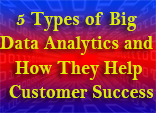This article discusses about the 5 types of Big Data Analytics which can be used helpful the customers to get maximum out of their data. Analytics software enables the users to get the relevant data which is necessary for business success in today's competitive environment.
Big data analysis faces the three-pronged problem areas of too much of volume to handle, unimaginably fast inward and outward data flow and a range and sort of data too difficult to assimilate. In spite of these problems, the reality is that Big Data can be utilized in real-time fraud detection, call centre optimization, intelligent traffic management, consumer sentiment analysis, the management of smart power grids, etc. Organizations with their ongoing Business Intelligence programmers can use Big Data Analytics to bring about customer success. It requires the right analytics for the organizations to benefit and make the most of it.
These are the five types of Big Data Analytics and their benefits:
- Prescriptive Analytics
- Diagnostic Analytics
- Descriptive Analytics
- Predictive Analytics
- Outcome Analytics
This is the best but the most under-employed of the five analytics. This technique helps an organization to find the best solution among a plethora of choices and suggests choices to employ a futuristic method. It is also capable of showing the organization the given propositions of each decision to improve decision-making. Prescriptive Analysis is futuristic, concentrates on optimal decisions for future situations,
This technique looks for the reason. It comprises of techniques like churn reason analysis and customer health score analysis. It caters to the most loyal of customers. It is rearward-looking and caters to causal relationships and sequences.
This occupies the most time. It also generates the least value. It provides foresight into whatever has taken place historically and proffers one with trends to unearth more details. Instances of this type of analytics are statistics, clustering and association rules used in market basket analysis. This form of analytics is backward-looking, concentrated on descriptions and comparisons and deals with pattern detections and descriptions.
In this type of Analytics, models are used to estimate impending events in specific scenarios. Instances include churn risk analysis and renewal risk analytics. It looks forward into the future, deals with quite non-discreet forecasts of conditions, relationships and archetypes.
This type of analytics is also known as Consumption Analytics and helps us to know about customer behavior that leads to specific effects. The customers' relationships with the products and services in question can be ascertained. It is backward-looking, real-time and forward-looking. This type of data analytics concentrates on consumption patterns and business outcomes that are linked to them.
Prescriptive Analytics is usually underutilized. Specific questions that are needed to be answered can be dealt with here. The Healthcare industry can really benefit from this type of analytics. Predictive Analytics can be used for sales lead scoring. Some analyze the entire sales process. This type of analytics can be used to support sales, marketing and such other complex forecasts. Diagnostic Analytics deals with the whys and the wherefores. In a social media marketing campaign the organization can find out the number of posts, mentions, followers, fans, page views, reviews, pins, etc. Last but not the least, Descriptive Analytics can uncover patterns that give us insights. It can be beneficial in the sales cycle, to label customers by their likely product preferences, and sales cycles.
Big Data Analytics contextualizes data and help customers and businesses alike. Good business decisions are possible. Customers are drawn towards the respective organization and the value of the business multiplies. The proper utilization of Big Data Analytics leads to the benefit of customers and profit for the business. It is Business Intelligence at optimum utilization and leads to immense customer satisfaction. In this age of complex business processes it is beneficial for the businessman and the customer, too.


[ 0 ] Comments